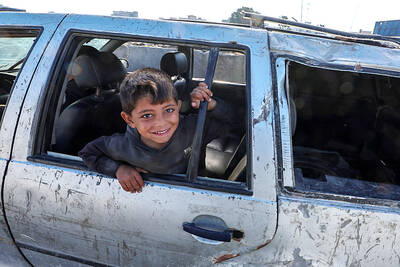Military officials view December as the optimal month for a US and Iraqi government offensive to reclaim the rebel enclave of Fallujah ahead of January national elections.
December is when Iraqi forces will come on line ready to participate in a full-fledged operation to take out Fallujah, considered the planning center for many of the spectacular car bombings that have plagued the country.
A security plan, drafted by the new Iraqi government and the top US General in Iraq, George Casey, calls for combined US and Iraqi security forces to claim back cities like Fallujah, Ramadi and Samarra that have swung out of their control.
The deadline is the January elections -- Iraq's first free polls in five decades -- which are in jeopardy amid the wave of bombings and assassinations. UN Secretary General Kofi Annan has raised skepticism about the date.
"Fallujah will be tough and we've got to make a decision when the cancer of Fallujah needs to be cut out ... We would like to end December at local control across the country," one senior officer told reporters.
The deputy for training Iraqi security forces, Brigadier Nigel Aylwin-Foster, told reporters that Iraqi forces still needed to gain more experience but that chances for victory would be high in December.
"It really depends on what level of risk the [Iraqi] leadership is prepared to take," Aylwin-Foster said.
"There will be a lot more security forces available by December. There will still be a level of risk, but there will be less risk than there is now because there will be more security forces."
But Aylwin-Foster stressed he did not know what the US and Iraqi leadership would decide was a proper number of Iraqi forces for an attack on Fallujah. Still, in December, roughly 7,200 men from nine elite intervention force battalions will be on line, with three of the units able to operate independently.
The intervention force has been designed specifically for fighting inside Iraq and is a by-product of April's failed US assault on Fallujah that saw Iraqi soldiers and national guard desert, unprepared to fight their countrymen.
The number of regular army battalions will have more than doubled to roughly 13,000 soldiers by December, with nine out of 16 battalions rated capable of independent action and trained for guerrilla warfare.
The interior ministry will also have a "civil intervention force," made up of police, ready in December to join any major fight, Aylwin-Foster added.
More than 40,000 national guardsmen would also be deployable for an offensive on rebel hotbeds.
The chairman of US joint chiefs of staff, General Richard Myers, stressed on Sept. 7 a campaign to reclaim Fallujah would need an Iraqi face and said Iraqi forces would not be ready until December.
"By December, we're going to have a substantial number of Iraqi security forces equipped, trained and led to conduct the kind of operations I was talking about,"

MONEY GRAB: People were rushing to collect bills scattered on the ground after the plane transporting money crashed, which an official said hindered rescue efforts A cargo plane carrying money on Friday crashed near Bolivia’s capital, damaging about a dozen vehicles on highway, scattering bills on the ground and leaving at least 15 people dead and others injured, an official said. Bolivian Minister of Defense Marcelo Salinas said the Hercules C-130 plane was transporting newly printed Bolivian currency when it “landed and veered off the runway” at an airport in El Alto, a city adjacent to La Paz, before ending up in a nearby field. Firefighters managed to put out the flames that engulfed the aircraft. Fire chief Pavel Tovar said at least 15 people died, but

LIKE FATHER, LIKE DAUGHTER: By showing Ju-ae’s ability to handle a weapon, the photos ‘suggest she is indeed receiving training as a successor,’ an academic said North Korea on Saturday released a rare image of leader Kim Jong-un’s teenage daughter firing a rifle at a shooting range, adding to speculation that she is being groomed as his successor. Kim’s daughter, Ju-ae, has long been seen as the next in line to rule the secretive, nuclear-armed state, and took part in a string of recent high-profile outings, including last week’s military parade marking the closing stages of North Korea’s key party congress. Pyongyang’s official Korean Central News Agency (KCNA) released a photo of Ju-ae shooting a rifle at an outdoor shooting range, peering through a rifle scope

South Korea would soon no longer be one of the few countries where Google Maps does not work properly, after its security-conscious government reversed a two-decade stance to approve the export of high-precision map data to overseas servers. The approval was made “on the condition that strict security requirements are met,” the South Korean Ministry of Land, Infrastructure and Transport said. Those conditions include blurring military and other sensitive security-related facilities, as well as restricting longitude and latitude coordinates for South Korean territory on products such as Google Maps and Google Earth, it said. The decision is expected to hurt Naver and Kakao

Gaza is rapidly running out of its limited fuel supply and stocks of food staples might become tight, officials said, after Israel blocked the entry of fuel and goods into the war-shattered territory, citing fighting with Iran. The Israeli military closed all Gaza border crossings on Saturday after announcing airstrikes on Iran carried out jointly with the US. Israeli authorities late on Monday night said that they would reopen the Kerem Shalom crossing from Israel to Gaza yesterday, for “gradual entry of humanitarian aid” into the strip, without saying how much. Israeli authorities previously said the crossings could not be operated safely during